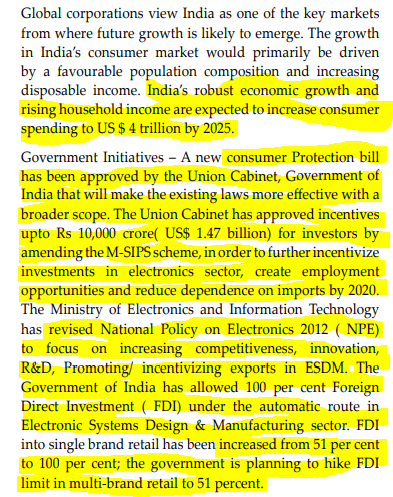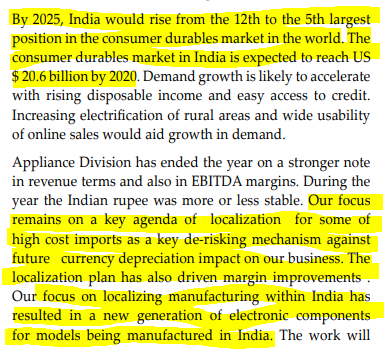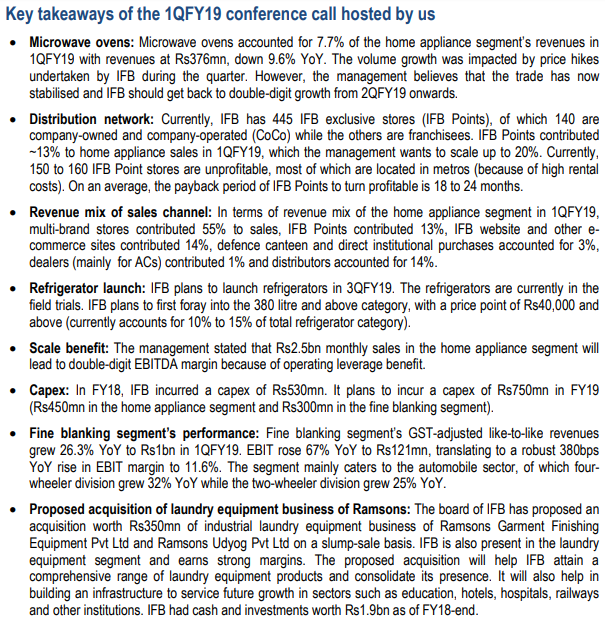IFB Industries a Can it Deliver!!!
I had no intentions of starting a thread on IFB Industries. But while reading one of the threads initiated by fellow member aJ2EE Professionala on aSharp Indiaa, I made a mention of IFB Industries and ended up hijacking the thread with few comments on IFB Industries 
Hence, thought that let me give birth to a thread on IFB Industries (as couldnat find an existing one at ValuePickr). I have taken the some help from one research report available in the public domain coupled with some secondary research to come up with this thread.
Market Cap: 514.60 Crores
Current Price: 124.60**
Promoter Stake: 75%
Background:
**
**
Promoter Stake: 75%
Background:
**Background:
IFB Industries also known as Indian Fine Blanks Limited started its operations in India in 1974 in collaboration with Hienrich Schmid AG of Switzerland.
Engaged in the manufacture and sale of home appliances and fine blanking components.
Home appliance products include washing machines (the company is majorly known for its Front Load Washing Machines), microwave ovens, domestic and commercial dish washers, dryers, kitchen appliances, and commercial laundry products.
Companyas fine blanking components comprise cushion plates for seat recliners; tongue for seat belt assembly; door latches; gate assembly for gear transmission; gear shift selectors, gear shift interlocks, and gear shifters for transmission; rotor segments for aircrafts; plate valves for compressors; and face comp drives, gears, cam plate assemblies, and sprockets for two wheelers.
-
Manufacturing facilities in Kolkata, Goa and Bangalore (Some parts imported as well)
-
80% revenue comes from home appliances and 20% from engg. Division (2014 figures)
-
Mkt. leader in Frontload Washing Machines with >50% market share (2014 figures)
-
Mkt. share in the Fully Automatic Washing Machine segment @ 15-17% (April. 2012 figures)
-
Mkt. share in Microwave Ovens @ 10%, and 3rd largest player after LG and Samsung (April. 2012 figures)
-
Mkt. share in Dishwashers and Clothes Dryer @ 95% (contribution to total company sales just 7% and are products that are not used much by the Indian middleclass) (April. 2012 figures)
Turnaround:****____
In 2001 the company was declared a sick unit due to mounting losses in the business and very high debt on its books.
In 2009 arrangement reached with Creditors involving interest waiver and the equity infusion by the promoters by the way of preferential allotment, helped the company emerge debt-free by the end of Fin year 2008-09.
Although declared sick IFB Inds. was doing well in terms of Sales and was also working upon Cost Reduction initiatives.
Recent Initiatives:
1). **Increase IFB Points )- **IFB points are franchise run retail stores. The company plans to increase their **IFB points **to increase the sales.
Sales from IFB Points are more profitable compared with sales through retail channels. These IFB points cater to Tier 1,2,3 cities.
As on December 2013 the company had total 481 service franchisees across India and it is expected to cross 500 numbers till the end of first quarter of FY15.
Sale of companyas products through IFB Points stood at 16 per cent in Q2FYa14 compared to 9 per cent in FYa13.
2). Exports Thrust a Focus on increasing sales through exports. It has started exporting to France, and is also in talks to export to Nigeria and Middle East
3). Indigenisation )- Company is also going to be benefited by indigenisation of its top loading washing machines that have been imported till now
4). **_New Launches _**a Launch of Air Conditioners and Refrigerators few quarters back
Positives:
1). Market for Front Load Washing Machines growing at >20% whereas the penetration is low at 7%
2). Mkt. leader in Frontload Washing Machines with >50% market share
3). Strong Brand Name
4). Good Distribution Network(Ask any housewife or even a washing machine salesperson of another company @ good frontload washing machines and more often than not you will get the answer as IFB)
5). Increasing Distribution Network in Tier1,2,3 cities
6). Has diversified into other white goods as well
7). Engg. Division should also do well with the general growth prospects and the outlook on the Automotive sector improving
8). Export plans lined up for white goods
9). Strong B/Sand almost a zero debt company
10). With Cash and Liquid investments of @ Rs.20 Crs. on a Mkt. Cap. of Rs. 500 odd Crs.
11). CAPEX at GOA facility complete which should benefit in future.
Negatives:
1). Company doesnat pay dividends. (Although the Mgmt. had clarified in the below article that they have not been paying dividends to fund expansion plans (Please Note: This article was published in July 2010)
2). Company had been debt laden in the past (Although the initiatives taken inspire confidence that it will be careful on debt front in future)
3). Lack of Pricing Power a This can be issue as it operates in a high competition segment which has the presence of deep pocketed MNCs like LG, Samsung, Whirlpool, etc.,. IFB may not be able to match their advertising spends as well. I am not sure about its ability to pass on the rise in the input costs to the customers. (But this existed in the past as well and despite this IFB has been able to maintain its market share and grow. Initiatives mentioned above coupled with the prospects of improving consumer sentiments, would bode well for the company and it should be able to maintain its margins for the next few quarters)
4). Rise in Input Costs a Apart from normal rise in input costs IFB also gets impacted due to depreciating Rupee as it imports some of the parts (indigenisation of its Top Loading Washing Machine as mentioned above would reduce the impact of Rupee depreciation in future and also the Rupee is expected to remain stable at current levels. Plus the thrust on Exports would negate any adverse impact of Rupee depreciation)
5). Higher Inflation a Rise in prices of Food Products, Petrol/Diesel, etc.,. may hamper the consumer spending as household budgets get impacted
6). Lack of basic amenities a The smaller cities/towns are faced with power shortage and water shortage which are essentials to operate washing machines
7). Continuous focus on R&D a This industry requires continuous focus on innovation due to its highly competitive nature and also because of the regular interface of the consumers with the products.
8). **Highly Competitive Industry a __**I need not say much on this J
____
____
Financial Performance:
The company had taken some Forex loss of @ Rs. 15 Crs. in FY14 as a result of Rupee depreciation. This should not be the case going forward due to stable Rupee.
Financial performance can be viewed in detail at_http://www.screener.in/company/?q=505726_
Iam interested in IFB Industries, as Iprefer Consumption stories with:
1). Good Brand Names,
2). Good Distribution Networks,
3). Good Penetration in Tier 1,2,3 cities,
4). Good Market Share in an Under Penetrated but Growing Segment,
5). **Less Competition **(As mentioned above, that, this unfortunately isnat the case in the industry that IFB operates in, but it has been able to hold its stead till now)
6). Good Pricing Power (Have already covered my reservations above)
7). And above all a GOOD MGMT. (Good Mgmt. is something that I am not sure about as yet, as the past doesnat inspire outright confidence but High Promoter Holding, initiatives taken on the business front, etc.,. enable me to give IFB industries a small allocation in my portfolio).
Please Note:
-
I am still learning in equity investing and hence would not be able to have an eye for detail like seniors. Hence please view the above post with an eye of a critic.
-
I am unable to spare time to go through the ARs due to my job and hence I would have definitely missed some primary information contained in the ARs.
-
The above information is through secondary research and hence request the readers to review and comment if any information is incorrect or has changed.
Discl: I am invested in IFB Industries.
Views Invited.

 Rather than regretting, the ability to laugh off on selling the shares and missing the rally in them is very important in these markets
Rather than regretting, the ability to laugh off on selling the shares and missing the rally in them is very important in these markets 



